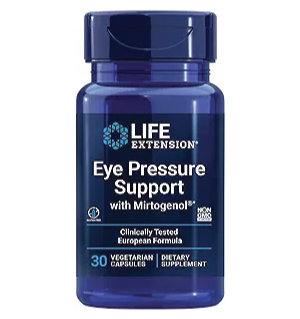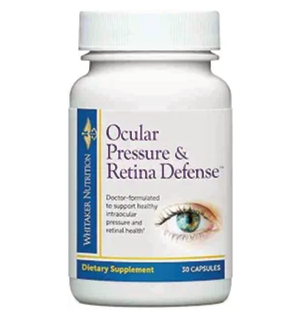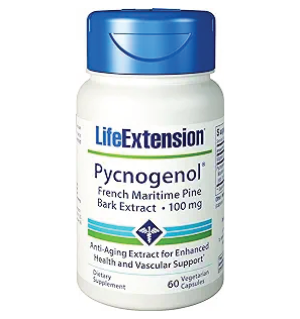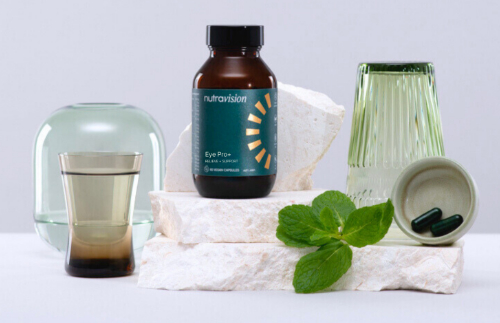
Have you heard of Mirtogenol as a natural glaucoma treatment? Before we discuss Mirtogenol, let’s find out a bit more about glaucoma first.
What is glaucoma and why is it important?
Glaucoma is a condition where there is progressive damage to the optic nerve, usually related to high pressure in the eye. This causes visual field loss and if untreated, eventual blindness.
Glaucoma is the second commonest cause of blindness worldwide, and affects at least 2% of the population. More than 60 million people are affected globally.
It is widely accepted that the retinal ganglion cells of the optic nerve become permanently and irreversibly damaged from glaucoma. It is this damage to the ganglion cells that eventually leads to blindness.
The conventional thinking is that any vision lost from the optic nerve damage cannot be recovered, hence the focus on monitoring and early glaucoma treatment.
What is Mirtogenol?
Mirtogenol is a patented combination of standardized bilberry extract (Mirtoselect) and French maritime pine bark extract (Pycnogenol). The standard dose is 120 mg per tablet, comprising 80 mg Mirtoselect and 40 mg Pycnogenol.
Mirtoselect is the extract for the bilberry Vaccinium myrtillus L. (a cousin of the blueberry), which is only fresh harvested during the ripening period from July to September. Mirtoselect and other good quality bilberry extracts are standardised to contain 36% anthocyanins, which are strong antioxidants.
Pycnogenol is the purest form of of the maritime pine bark (Pinus pinaster) extract. There are stringent requirements for its production, so that the result is a pure extract that does not contain any residual pesticide or solvents. It is standardized to contain 70% proanthocyanidins, which are also powerful antioxidants.
(Just for comparison, proanthocyanidins are 20 times more powerful than vitamin C and 50 times more powerful than vitamin E.)
Both are known for their ability to improve healthy blood flow to the eye and other parts of the body, by increasing the production of endogenous nitric oxide.
Is bilberry (Mirtoselect) beneficial for the eye?
Yes! Bilberry is an absolute powerhouse when it comes to eye health. It is beneficial for dry eye syndrome, eye fatigue, macular degeneration (when used in combination with other antioxidants), and importantly, also for glaucoma.
That’s promising! Is French maritime pine bark extract (Pycnogenol) also beneficial for the eye?
So how does Mirtogenol work as a natural glaucoma treatment?
In 2008, Mirtogenol was first reported to reduce the eye pressure and improve ocular blood flow in individuals with high eye pressure. After 3 months of treatment with Mirtogenol 120 mg taken twice daily, the eye pressure decreased by an average of 3 mmHg, in almost all (19 out of 20) subjects. There was no change in pressure in the control group.
In a subsequent study published 2010, 79 patients with high eye pressure were divided into 3 groups: one with Mirtogenol 120 mg daily, one with standard latanoprost eye drop treatment, and one with a combination of both.
The results were fascinating. Mirtogenol alone was able to reduce the eye pressure almost as much as latanoprost (latanoprost is a prostaglandin analog eye drop which is commonly prescribed as first-line medical treatment for glaucoma). However the pressure reduction with Mirtogenol was achieved over 16 weeks compared to 4 weeks with latanoprost.
The combination of Mirtogenol and latanoprost achieved even better pressure reduction than either alone, from 38 mmHg to 24 mmHg, after 6 weeks. The pressure lowering effect was maintained until the end of the study period of 6 months. At the end of the study, 58.1% of the subjects treated with Mirtogenol and latanoprost had normal eye pressure levels (compared with 41.4% in the latanoprost-only group).
Finally, a study from Japan published in 2021 found that a combination of Mirtoselect 90 mg and Pycnogenol 40 mg taken once daily for 4 weeks was able to reduce the pressure by an additional 8.7% in glaucoma patients who are already on glaucoma eye drops.
See Related: Medical treatments for glaucoma
Are there side effects and risks from Mirtogenol?
So far, none of the studies on Mirtogenol as a natural glaucoma treatment have reported any serious side effects.
Similarly, studies on the individual components (Mirtoselect and Pycnogenol) have not recorded any serious side effects either.
Minor side effects do sometimes occur, including bad breath, upset stomach, and headaches.
There may a possible theoretical increased risk of bleeding, so please use with caution if you are taking blood-thinning medications (such as aspirin and warfarin), or if you have a health condition that increases bleeding (such as chronic liver disease or low blood platelets).
Another potential risk relates to diabetes. Bilberry can lower blood sugar, so if taken in combination with diabetes medications, may increase the risk of hypoglycemia (blood sugar levels becomes too low).
I have glaucoma. Should I take Mirtogenol anyway?
Since Mirtogenol is quite safe with no major concerns regarding side effects or drug interactions, I am quite comfortable for my patients to take Mirtogenol as a natural glaucoma treatment.
In my clinical practice, I have been recommending Mirtogenol supplements to 2 groups of patients.
The first group are patients who have high eye pressure but no glaucoma damage yet, and they wish to reduce their eye pressure without eye drops or selective laser trabeculoplasty.
The second group are mild glaucoma patients who have eye pressure which is not quite sufficiently controlled with eye drops or laser. Because there is not yet the need to undergo glaucoma surgery, it is worthwhile trying Mirtogenol first to see if the eye pressure can be lowered to an acceptable level.
Mirtogenol is available for purchase online through Amazon or iHerb.
If you wish to take Mirtogenol as a natural glaucoma treatment, or its individual components Mirtoselect (bilberry) and Pycnogenol (French maritime pine bark) to prevent and reduce your risk of glaucoma blindness, below are highly-rated and recommended supplements that are available for you to purchase through Amazon:
Are there alternatives similar to Mirtogenol?
Some have asked me if there is an alternative to Mirtogenol, and the answer is yes. It is most likely that the beneficial effects of Mirtogenol are derived from the combination of anthocyanins from bilberry and proanthocyanidins from French maritime pine bark.
Another excellent source of proanthocyanidins is grape seed extract. In fact, grape seed extract contains even more proanthocyanidins than French maritime pine bark (95% vs 80%). As with Pycnogenol, grape seed extract has been found to improve outcomes in eyes with diabetic retinopathy.
It therefore stands to reason that the combination of anthocyanins from bilberry and proanthocyanidins from grape seed will also elicit similar beneficial clinical effects as Mirtogenol.
This means that you should be able to take any combination of bilberry extract and grape seed extract at similar dosages and experience similar benefits to Mirtogenol.
See Related: Natural glaucoma vitamins for your optic nerve
Are there any other alternative natural remedies for glaucoma?
Yes! Mirtogenol is a great natural glaucoma treatment. But there are other widely available natural supplements that can be used to complement your existing glaucoma treatment.
It is worth repeating that if you are considering any of the natural glaucoma supplements and remedies, please make sure to discuss with your eye specialist and family doctor first to avoid adverse drug interactions and unwanted side effects.
See Related:







